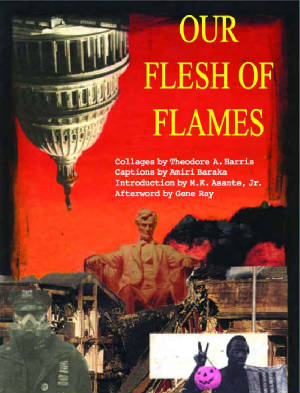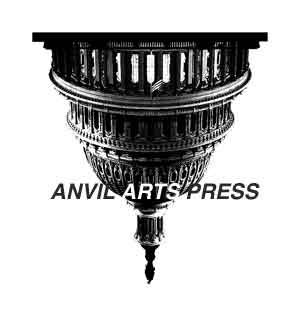|
OUR FLESH OF FLAMES:
Collages by Theodore A. Harris
Captions by Amiri Baraka
Introduction by M. K. Asante, Jr.
Afterword by Gene Ray
|
|
| WE HOPE TO HAVE A SECOND PRINTING SOON! |
| SOLD OUT! |

|
| Detail from back cover |

|
Harris and Baraka's visual poetry of agony wrings out our despair through images and words of truth. Hearing, seeing and reading
the truth is an inoculation against hopelessness as it unties the will and pumps up energy to resist. In new American Nazi
times Baraka's words and Harris' images weave an oracle declaring the vivid ugly truth of Americas legacy of slavery and racism
while America lynches Iraq, testing heinous weapons on soft human brown flesh, like we lynched Vietnam, Panama... Harris and
Baraka are healing us and directing us to see clear through the lies and deception. Their clarity provokes insights, energizing
us on to deeds of resistance.
Howardena Pindell artist,writer
State University of New York at Stony Brook
This seminal collaboration between Theodore Harris and Amiri Baraka exemplies the immense possibilities of anti-imperialistic
cultural work!
Firmly entrenched in the resistance tradition in both stylistic innovation and thematic counter-ideological struggle.
Tony Bolden
University of Alabama

Publisher's Note:
The assembly line.
Manufacturing munitions is steady work if you can get it, the pays not much, the hours are long, and it can be dangerous.
Its steady work however and no one can deny the need for the product in todays world.
When you meet a fabricator, working or not, one is impressed with the intensity of their purpose. This activity of production
demands a discipline of African proportions, as careful, consistent and unremitting as the development of our species on that
continent. The reason for this is the nature of the product that is being assembled. All of the technique and skill required
to manipulate the raw material and construct the device requires complete concentration and infinite attention to detail.
The responsibility resting on the shoulders of the worker regarding the importance of this product in the hands of the end
user is ever present. The overall purpose and context must be thoroughly comprehended. Mistakes are quickly punished. This
trade is the fabric of our struggle and the revolution is naught without it.
Such is the content of this volume. The two comrades whose work appears here waste nothing in their efforts to honor the
history of this assembly line and its purpose. From Nat Turner to V. M. Molotov the instruments of struggle for liberation
and justice have required cadre on these assembly lines. The work is steady if you can get it, the pays not much, the hours
are long and it can be dangerous...
|


